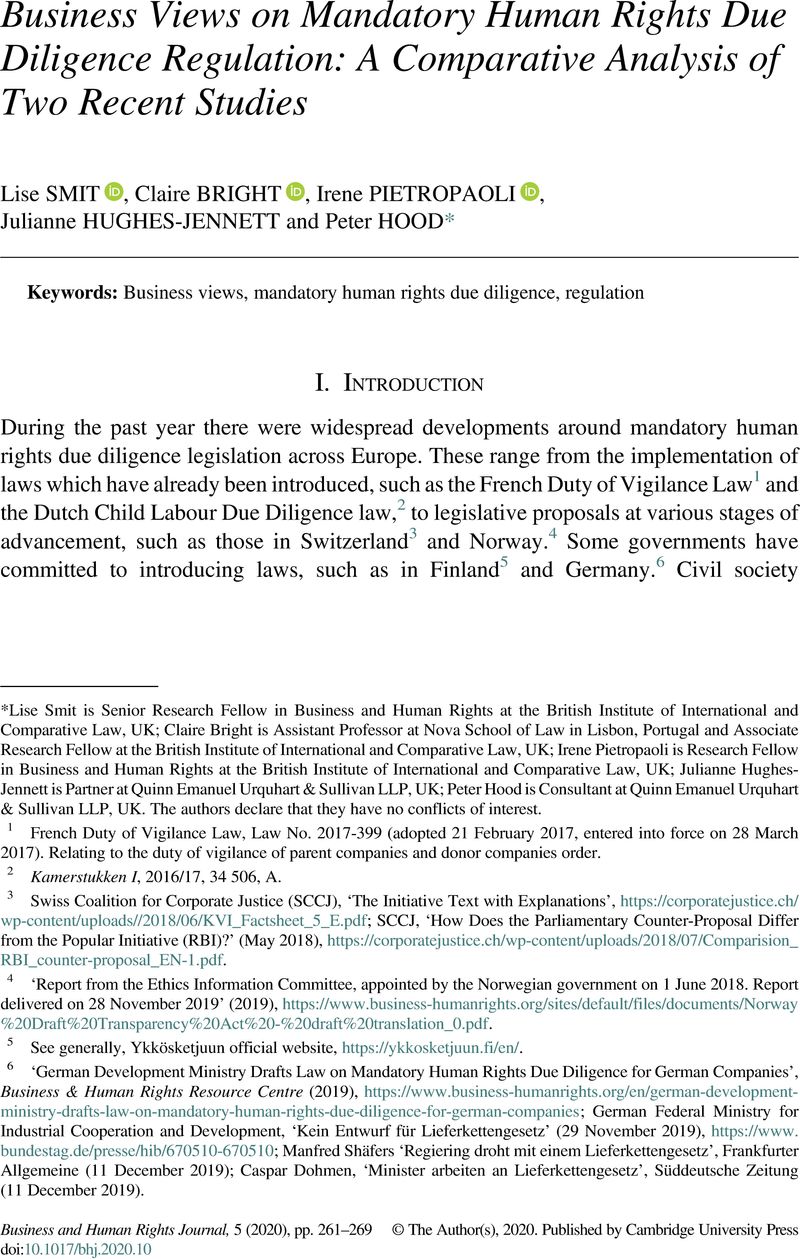Article contents
Business Views on Mandatory Human Rights Due Diligence Regulation: A Comparative Analysis of Two Recent Studies
Published online by Cambridge University Press: 19 June 2020
Abstract

- Type
- Developments in the Field
- Information
- Copyright
- © The Author(s), 2020. Published by Cambridge University Press
Footnotes
Lise Smit is Senior Research Fellow in Business and Human Rights at the British Institute of International and Comparative Law, UK; Claire Bright is Assistant Professor at Nova School of Law in Lisbon, Portugal and Associate Research Fellow at the British Institute of International and Comparative Law, UK; Irene Pietropaoli is Research Fellow in Business and Human Rights at the British Institute of International and Comparative Law, UK; Julianne Hughes-Jennett is Partner at Quinn Emanuel Urquhart & Sullivan LLP, UK; Peter Hood is Consultant at Quinn Emanuel Urquhart & Sullivan LLP, UK. The authors declare that they have no conflicts of interest.
References
1 Loi no. 2017-399 du 27 Mars 2017 relative au devoir de vigilance des sociétés mères et des entreprises donneuses d’ordre.
2 Kamerstukken I, 2016/17, 34 506, A.
3 Swiss Coalition for Corporate Justice (SCCJ), ‘The Initiative Text with Explanations’, available at: https://corporatejustice.ch/wp-content/uploads//2018/06/KVI_Factsheet_5_E.pdf; SCCJ, ‘How Does the Parliamentary Counter-Proposal Differ from the Popular Initiative (RBI)?’, May 2018, available at: https://corporatejustice.ch/wp-content/uploads/2018/07/Comparision_RBI_counter-proposal_EN-1.pdf.
4 Report from the Ethics Information Committee, appointed by the Norwegian government on 1 June 2018. Report delivered on 28 November 2019, draft translation of Part I available at: https://www.business-humanrights.org/sites/default/files/documents/Norway%20Draft%20Transparency%20Act%20-%20draft%20translation_0.pdf.
5 Ykkösketjuun official website, available at: https://ykkosketjuun.fi/en/.
6 Business and Human Rights Resource Centre (BHRRC), ‘German Development Ministry Drafts Law on Mandatory Human Rights Due Diligence for German Companies’, available at: https://www.business-humanrights.org/en/german-development-ministry-drafts-law-on-mandatory-human-rights-due-diligence-for-german-companies; German Federal Ministry for Industrial Cooperation and Development (BMZ) ‘Kein Entwurf für Lieferkettengesetz’, 29 November 2019, available at: https://www.bundestag.de/presse/hib/670510-670510; Manfred Shäfers ‘Regiering droht mit einem Lieferkettengesetz’, Frankfurter Allgemeine, 11 December 2019; Caspar Dohmen, ‘Minister arbeiten an Lieferkettengesetz’, Süddeutsche Zeitung, 11 December 2019.
7 Open letter by CSOs ‘Belgique: Des ONG demandent une loi qui oblige les entreprises à respecter les droits de l'homme et l'environnement’, 23 April 2019, available at: https://www.business-humanrights.org/fr/belgique-des-ong-demandent-une-loi-qui-oblige-les-entreprises-%C3%A0-respecter-les-droits-de-lhomme-et-lenvironnement.
8 Folketinget, ‘B 82 Forslag til folketingsbeslutning om at gøre det lovpligtigt for virksomheder at udøve nødvendig omhu på menneskerettighedsområdet og om indførelse af effektive retsmidler’, 24 January 2019, available at: https://www.ft.dk/samling/20181/beslutningsforslag/b82/20181_b82_som_fremsat.htm.
9 Open letter to the Italian institutions on the issue of Business and Human Rights, 11 November 2019, available at: https://www.business-humanrights.org/sites/default/files/Open_letter_B%26HR_English.pdf.
10 Open letter from CSOs, 10 April 2019, available at: https://corporate-responsibility.org/wp-content/uploads/2019/04/190409_UK-mHRDD-campaign-statement_FINAL-with-logos.pdf.
11 ECCJ, ‘ECCJ Legal Brief: EU Model Legislation on Corporate Responsibility to Respect Human Rights and the Environment’, 26 February 2020, available at: https://corporatejustice.org/eccj-publications/16804-eccj-legal-brief-eu-model-legislation-on-corporate-responsibility-to-respect-human-rights-and-the-environment.
12 UN Human Rights Council, ‘Guiding Principles on Business and Human Rights: Implementing the United Nations “Protect, Respect and Remedy” Framework’, A/HRC/17/31 (21 March 2011).
13 For example, Irene Pietropaoli, Lise Smit, Julianne Hughes-Jennett and Peter Hood, A UK Failure to Prevent Mechanism for Corporate Human Rights Harms, 11 February 2020, available at: https://www.biicl.org/publications/a-uk-failure-to-prevent-mechanism-for-corporate-human-rights-harms (UK study) at 19.
14 Lise Smit, Claire Bright, Robert McCorquodale, Matthias Bauer, Hanna Deringer, Daniela Baeza-Breinbauer, Francisca Torres-Cortés, Frank Alleweldt, Senda Kara, Camille Salinier and Héctor Tejero Tobed for the European Commission DG Justice and Consumers, Study on Due Diligence Requirements Through the Supply Chain, 24 February 2020, available at: https://op.europa.eu/en/publication-detail/-/publication/8ba0a8fd-4c83-11ea-b8b7-01aa75ed71a1/language-en (EC study Final Report).
15 UK study above note 13.
16 UK Joint Committee on Human Rights (JCHR), Human Rights and Business 2017: Promoting Responsibility and Ensuring Accountability, Sixth Report of Session 2016-17, 5 April 2017, available at: https://publications.parliament.uk/pa/jt201617/jtselect/jtrights/443/443.pdf.
17 EC study above note 14, Annexures, Part II: Survey Results Statistics, available at: https://op.europa.eu/en/publication-detail/-/publication/5bd8a55a-4c84-11ea-b8b7-01aa75ed71a1/language-en at 16–17.
18 UK study at 10.
19 Ibid at 11.
20 In the EC study, 65.9 per cent of business survey respondents have over 1000 employees (EC study Final Report at 45). In the UK study, 66.5 per cent of respondents were from large multi-national companies (UK study at 11).
21 European Commission Better Regulation Guidelines, SWD (2017) 350, 7 July 2017, available at: https://ec.europa.eu/info/sites/info/files/better-regulation-guidelines.pdf at 28.
22 EC study Final Report at 94. The remaining 21.9 per cent selected ‘Do not know’, Final Report at 95.
23 Ibid at 95.
24 UK study at 12.
25 Lungowe v Vedanta Resources plc [2019] UKSC 20.
26 UK study at 12.
27 EC study Final Report at 153.
28 Ibid.
29 EC study Part II: Survey Results Statistics above note 17 at 28, italics added.
30 EC study Final Report at 90–91.
31 Ibid at 146.
32 UK study at 14.
33 EC study Final Report at 145.
34 UK study at 14.
35 EC study Final Report at 144.
36 EC study Final Report at 148.
37 UK study at 14.
38 EC study Final Report at 148.
39 Ibid at 142. Only 9.7 per cent of business respondents disagreed with this proposition.
40 UK study at 16.
41 Ibid.
42 Ibid.
43 Ibid at 17.
44 Ibid.
45 EC study Final Report at 108.
46 Ibid at 107.
47 UK study at 52.
48 EC study Final Report at 105.
49 Ibid.
50 Anne Duthilleul and Matthias de Jouvenel, ‘Evaluation de la mise en oeuvre de la loi no. 2017-399 du 27 mars 2017 relative au devoir de vigilance des sociétés mères et des entreprises donneuses d’ordre’, Report to the French Minister of Economy and Foreign Affairs, January 2020, available at: https://www.economie.gouv.fr/cge/devoir-vigilances-entreprises, at 38.
51 Carl Mortished, ‘Bribery or Seduction?’, Wall Street Journal, 7 February 2011, available at: https://www.wsj.com/articles/SB10001424052748703296604576005062575694024; Sandra Cossart, Jérôme Chaplier and Tiphaine Beau de Loménie, ‘The French Law on Duty of Care: a Historic Step Towards Making Globalization Work for All’ (2017) 2(2) Business and Human Rights Journal 317.
- 12
- Cited by


